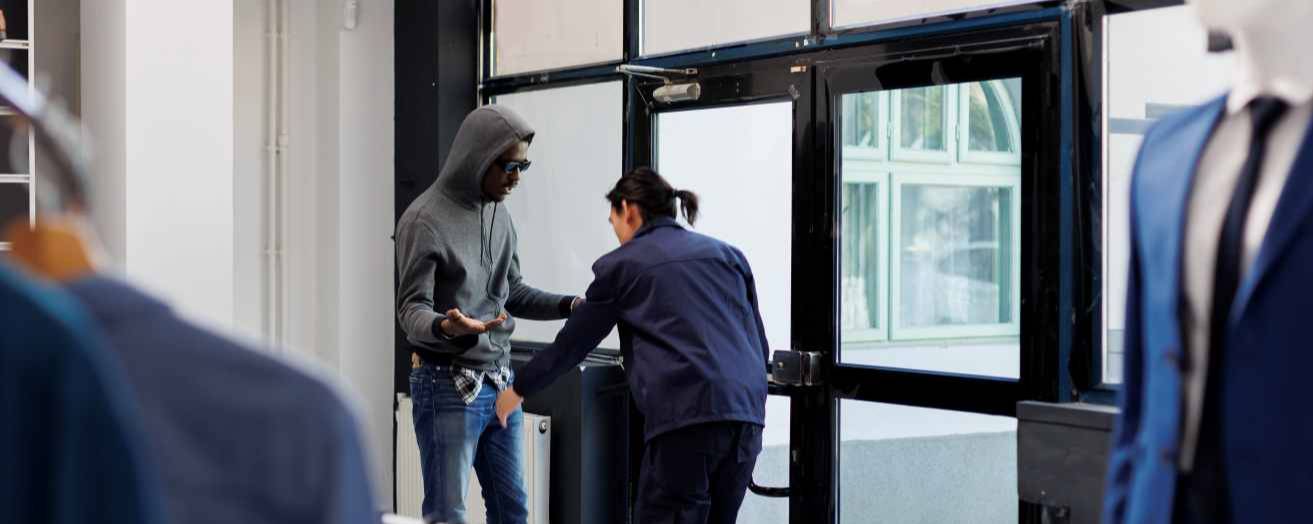The retail security industry represents one of the fastest-growing sectors within the UK’s private security landscape, with retail crime costing British businesses over £1.8 billion annually. As shopping centres, department stores, and retail outlets face increasing security challenges amid a shoplifting crisis, the demand for skilled retail security professionals has reached unprecedented levels.
This comprehensive guide provides everything you need to launch a successful career as a retail security officer.
Who Are Retail Security Officers and Why Are They Essential?
A retail security officer serves as the crucial first line of defence against theft, fraud, and security threats in commercial environments. Unlike door supervision or event security roles, retail security requires a unique combination of loss prevention expertise, customer service skills, and security awareness tailored specifically to commercial settings.
Retail security officers do more than monitor entrances—they patrol shop floors, spot suspicious behaviour, and respond swiftly to incidents like theft or emergencies. They work closely with staff and police, handle situations calmly under pressure, and complete detailed incident reports. Their presence protects assets and promotes a safe, reassuring environment for customers and staff alike.
Recommended Reading: The Retail Crime Epidemic in the UK

What Skills Do You Need for a Retail Security Career?
Before you can kickstart a career in retail security, it’s important to know what’s absolutely essential and what can give you an edge. The Security Industry Authority (SIA) sets the rules for who can legally work in security roles, including the training and licence you’ll need to get started. But beyond the basics, certain skills and qualifications can really help you stand out from the crowd.
Essential Requirements:
- 18+ years of age
- Authorised to work in the UK
- Clean criminal record
- Basic literacy and numeracy
- SIA licence
Good-To-Have Qualifications
- Customer service experience
- Previous security or retail work experience
- CCTV operation experience
- First aid certification
- Additional security training
The SIA licensing process specifically covers retail security work under the Security Guard licence category, which is mandatory for anyone working in security roles within retail environments. Background check requirements are particularly stringent, as security professionals are entrusted with protecting people and property.
Your 5-Step Pathway to Retail Security Success
Now that you know what the role involves and what it takes to succeed, let’s walk through how to get started in retail security—step by step.
Step 1: Confirm SIA Licence Eligibility and Requirements
Check your eligibility for an SIA licence through the official government website. Make sure you have the required documents and training pre-requisites ready and that you meet the SIA licence requirements.
Step 2: Book the Right SIA Training Course
Book a security course with Get Licensed after ensuring the training you select covers the required components and meets industry standards.
Most retail security training programmes require 4-6 days of classroom instruction, depending on whether you opt for security guard training or door supervisor training.

Step 3: Complete SIA Examinations and Licence Application
The examination process tests understanding of security principles and legal requirements through multiple-choice questions and scenario-based assessments.
Once examinations are passed, online licence applications include identity verification, certificate uploads, and fee payment.
Step 4: Secure Entry-Level Retail Security Positions
Entry-level opportunities appear on specialist security job boards under various titles, including retail security officer, store security guard, and loss prevention officer.
The hiring process typically involves competency-based interviews focusing on customer service experience and security knowledge.
Step 5: Pursue Continuous Professional Development
Career advancement requires ongoing skill development through additional certifications in CCTV operation, advanced conflict management, or cyber security.
Core Duties: What Retail Security Officers Actually Do
Retail security is often misunderstood as just “watching the door,” but in reality, it’s a fast-paced, varied role that blends safety, observation, and customer interaction every day.

Here’s what you’ll actually be doing as a retail security professional:
Patrolling and Deterrence
Visible, strategic patrolling helps deter theft and maintain a secure environment. Varying patrol routes keeps potential offenders guessing.
CCTV & Alarm Monitoring
Officers must monitor surveillance systems effectively and log activity accurately to support investigations and response efforts.
Incident Response & Legal Awareness
Understanding citizens’ arrest laws (Section 24A, PACE 1984) is key, along with precise, timely incident reporting.
Customer Interaction
Retail security often doubles as customer service. Officers need to balance authority with approachability when assisting the public.
Why Retail Security Represents a Growing Career Field
The retail security sector demonstrates remarkable growth driven by rising retail crime statistics and technological advancements requiring skilled operators. Economic stability characterises the security profession, with businesses recognising security as essential regardless of economic conditions.
Career advancement pathways lead to supervisory roles, security management positions, or specialisation in loss prevention investigation. Entry-level positions typically start at £18,000-£22,000 annually, with experienced officers earning £25,000-£30,000.
Security managers can achieve £35,000-£50,000 or more, particularly in London where rates reflect higher living costs.
Recommended Reading: Retail shoplifting in the UK
How to Level Up as a Retail Security Officer
Once you’re confident in your role, advancing your skills and qualifications can open doors to better pay, greater responsibility, and long-term career growth.
SIA Door Supervisor Licence: A Strategic Upgrade
If you haven’t already completed a door supervisor course, retail security is the perfect gateway to it. Gaining your door supervisor licence gives you more authority and versatility. It includes physical intervention and advanced conflict management training for licensed premises—crucial in busy retail environments where tensions can run high.
CCTV and Emergency First Aid: In-Demand Extras
Retailers increasingly rely on surveillance and rapid incident response. CCTV operation training enhances your tech skills, while Emergency First Aid prepares you for medical incidents on the shop floor. Together, these can increase your job prospects significantly.
Customer Service and Conflict Resolution Skills
Soft skills matter just as much as formal training. Courses in customer service or verbal conflict de-escalation can help you manage difficult interactions calmly and professionally—making you a standout in any customer-facing role.
CPD or Online Certifications
Consider CPD-accredited short courses in areas like risk assessment, theft prevention strategies, or incident reporting. Online modules make it easy to learn at your own pace while adding valuable credentials to your CV.
Cybersecurity and Retail Tech Awareness
With digital theft on the rise, basic knowledge of cybersecurity and point-of-sale systems can give you a competitive edge—especially in high-end or tech-heavy retail environments.
By combining your frontline experience with smart upskilling, you’ll position yourself as an indispensable part of any retail security team—and be ready to move into supervisory or specialist roles when the time comes.
Frequently Asked Questions About Retail Security Careers
Retail security focuses on loss prevention and customer service in commercial environments, working regularly at the same location. Door supervision involves access control at licensed premises, whilst event security manages temporary crowd control.
Yes, many retail positions offer flexible scheduling, including part-time, evening, and weekend shifts, accommodating student schedules.
Officers can make citizens’ arrests under specific circumstances with reasonable grounds for suspicion, but must follow proper procedures with proportionate force.
While confrontational situations can occur, most incidents involve verbal de-escalation rather than physical intervention. Proper training significantly reduces risks.

Take Your Next Step Toward a Rewarding Security Career
Starting your retail security career begins with an honest self-assessment of role suitability, followed by obtaining necessary training and licensing through reputable providers. Get Licensed offers comprehensive SIA-approved training courses specifically designed for retail security success. Our experienced instructors provide practical, real-world training exceeding minimum requirements to give you competitive advantages in this dynamic job market.
Don’t wait to start your rewarding career in retail security. Book your SIA training course today and take the first step toward a stable, growing profession that makes a real difference in your community.












